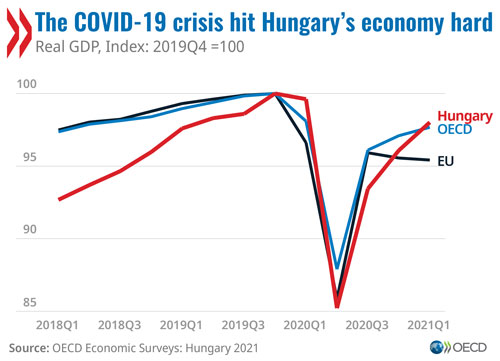Hungary
Hungary: reforms to raise productivity would strengthen recovery from COVID-19, says OECD
30/07/2021 - Hungary’s economy is emerging from the crisis caused by COVID-19, yet sustaining the country’s robust pre-pandemic levels of growth will require reforms to foster productivity and job creation, according to a new OECD report.
The latest OECD Economic Survey of Hungary says that with labour shortages being felt as the economy picks up, it is vital to invest in vocational training, digital skills and apprenticeships to match skills with market requirements. Improving transport links and the availability of housing would make it easier for workers in low-employment areas to take up jobs elsewhere. Creating a more competitive and transparent business environment and accelerating firms’ adoption of digital technologies would also bolster the recovery.
“Hungary’s economy was doing well before the crisis, and with external demand picking up, prospects for a solid recovery are good. It is important to use this period, and the forthcoming inflow of EU funds, to raise productivity and competitiveness to ensure a strong and lasting recovery,” said OECD Director of Economic Country Studies Alvaro Pereira, presenting the report alongside Hungary’s Secretary of State for Financial Policy Gábor Gion.
 The COVID-19 crisis hit Hungary’s export-oriented economy hard, ending a period of steady growth over 2016-19 that lifted incomes and brought down the unemployment rate to a 30-year low. Policy support to workers and firms, and the swift rollout of vaccines, has smoothed the path to recovery, and the Survey projects growth of 4.6% in 2021 and 5% in 2022, following a drop of 5.1% in 2020. An annual injection of EU structural and Next Generation COVID recovery funds equivalent to around 3.5% of GDP in total from 2021 will support growth if invested well.
The COVID-19 crisis hit Hungary’s export-oriented economy hard, ending a period of steady growth over 2016-19 that lifted incomes and brought down the unemployment rate to a 30-year low. Policy support to workers and firms, and the swift rollout of vaccines, has smoothed the path to recovery, and the Survey projects growth of 4.6% in 2021 and 5% in 2022, following a drop of 5.1% in 2020. An annual injection of EU structural and Next Generation COVID recovery funds equivalent to around 3.5% of GDP in total from 2021 will support growth if invested well.
Short-term risks remain, such as the impact of a global shortage of semiconductors on Hungarian car production. Targeted support to households and businesses should be continued as long as is needed. Once the recovery is self-sustained, the focus should return to strengthening public finances ahead of looming increases in health and pension spending from an ageing population, the Survey says, including by completing an ongoing increase in the retirement age to 65 by 2022 and linking further increases to gains in life expectancy.
The ageing and shrinking workforce makes it urgent to raise labour productivity. In addition to strengthening vocational and tertiary education, it is key to produce more of the highly skilled engineers and ICT graduates that businesses increasingly demand. In this context, the Survey recommends making high-speed mobile Internet cheaper and helping firms to rapidly adopt digital technologies. Intensifying efforts to fight corruption, including continuing to strengthen the institutional framework, and ensuring the independence and accountability of the judicial system would improve the investment climate and support business dynamism.
Worker mobility could be enhanced by improving transport connections from rural areas into cities, modernising housing regulations to expand the private rental market, and easing some of the rigid licensing and certification requirements on professional occupations. Hungary could also consider increasing the duration of unemployment benefits from the current three months.
Finally, Hungary’s economy would benefit from a more growth-friendly tax structure. The Survey suggests continuing to reduce labour taxes and phasing out distortionary taxes on turnover in sectors like energy, finance and retail which hinder new entry and investment. This could be balanced by increasing consumption, property and environmental tax revenues, while simplifying the value-added tax system by moving to a lower but broader-based VAT rate.
See a Survey Overview with key findings and charts (this link can be used in media articles).
For further information, journalists are invited to contact Catherine Bremer in the OECD Media Office (+33 1 45 24 80 97).
Working with over 100 countries, the OECD is a global policy forum that promotes policies to preserve individual liberty and improve the economic and social well-being of people around the world.
Related Documents